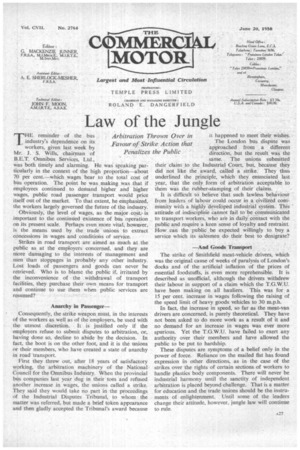Law of the Jungle
Page 29

If you've noticed an error in this article please click here to report it so we can fix it.
THE reminder of the bus Arbitration Thrown Over in industry's dependence on its _Favour of Strike Action that workers, given last week by Mr. J. S. Wills, chairman of Penalizes the Public R.E.T. Omnibus Services, Ltd., was both timely and alarming. He was speaking particularly in the context of the high proportion—about 70 per cent.—which wages, bear to the total cost of bus operation. The point he was making was that if employees continued to demand higher and higher wages, public road passenger transport would 'price itself out of the market. To that extent, he emphasized, the workers largely governed the future of the industry.
Obviously, the level of wages, as the major cost, is important to the continued existence of bus operation on its present scale. Perhaps even more vital, however, is the 'means used by the trade unions to extract concessions in wages and conditions of service.
Strikes in road transport are aimed as much at the public as at the employers• concerned, and they are more damaging to the interests of management and men than stoppages in probably any other industry. Lost loads of passengers and goods can never be retrieved. Who is to blame the public if, irritated by • the inconvenience of the withdrawal of transport facilities, they purchase their own means for transport and continue to use them when public services are resumed?
• Anarchy in Passenger— Consequently, the strike weapon must, in the interests of the workers as well as of the employers, be used with the utmost discretion. It is justified only if the employers refuse to submit disputes to arbitration, or, having done so, decline to abide by the decision. In fact, the boot is on the other foot, and it is the unions or their members, who have created a state of anarchy in road transport.
First they threw out, after 18 years of satisfactory working, the arbitration machinery of the National. Council for the Omnibus Industry. When the provincial bus companies last year dug in their toes and refused another increase in wages, the unions called a strike. They said they would take no part in the proceedings of the Industrial Disputes Tribunal, to whom the matter was referred, but made a brief token appearance and then gladly accepted the Tribunal's award because it happened to meet their wishes.
The London busdispute was approached from a different direction, but the result was the same. The unions submitted their claim to the Industrial Court, but, because they did not like the award, called a strike. They thus underlined the principle, which they enunciated last year, that the only form of arbitration acceptable to them was the rubber-stamping of their claims.
It is difficult to believe that such lawless behaviour from leaders of labour could occur in a civilized coinmunity with a highly developed industrial system. This attitude of indiscipline cannot fail to-be communicated to transport workers, who are in daily, contact with the public and require a keen sense of loyalty and restraint. How can the public be expected willingly to buy a service which its salesmen do their best to denigrate?
—And Goods Transport The .strike of Smithfield meat-vehicle drivers, which was the original cause of weeks of paralysis of London's docks and of the artificial inflation of the prices of essential foodstuffs, is even more reprehensible. It is described as unofficial, although the drivers withdrew their labour in support of a claim which the T.G.W.U. have been making on all hauliers. This was for a 15 per cent. increase in wages following the raising of the speed limit of heavy goods vehicles to 30 m.p.h.
In fact, the increase in speed, so far as the meat-van drivers are concerned, is purely theoretical. They have not been asked to do more work as a result of it and no demand for an increase in wages was ever more spurious. Yet the T.G.W.U. have failed to exert any authority over their members and have allowed the public to be put to hardship.
These disputes are symptoms of a belief only in the power of force. Reliance on the mailed fist has found expression in other directions, as in the case of the strikes over the rights of certain sections of workers to handle plastics body components. There will never be industrial harmony until the sanctity of independent arbitration is placed beyond challenge. That is a matter for education and the trade unions should be the instruments of enlightenment. Until some of the leaders change their attitude, however, jungle law will continue to rule.




































































































